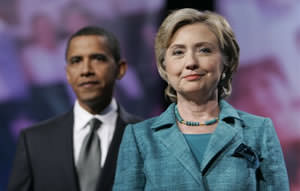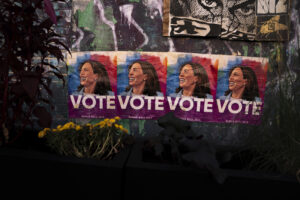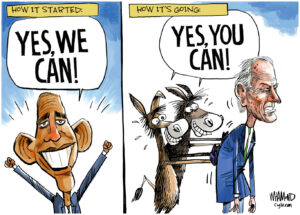Candidates for Sale
As Hillary Clinton and Barack Obama know well, this season's crop of presidential candidates can't ignore the super-famous, the super-rich, or those fund-raising impresarios known as "bundlers" in their quest for the White House -- and that campaign trend isn't likely to change anytime soon.
The most maddening view of the race for the Democratic presidential nomination is found in an excellent Los Angeles Times column, Cause Célebrè, which reports on how Hollywood’s super-rich are buying their way into the campaign.
Columnist Tina Daunt examines celebrity politics in the manner of a skilled anthropologist as she relates how political fund-raising is affected by the culture and social relations of the celebrities who dwell in what she describes as the world west of Doheny Boulevard. “In Hollywood, everything is about relationships — not only cultivating them but also tending them,” she wrote recently. “The bigger the name, the larger the need for attention.”
Even people who are bored by politics appreciate Daunt because she writes about celebrities. Her column about one of the biggest names, Oprah Winfrey, was really maddening to me because it was such a perfect example of the outsized influence of big names. Winfrey is hostess to the year’s most famous political fund-raiser so far, the Sept. 8 party for Barack Obama at her Santa Barbara-area estate. The cheapest ticket is $2,300. Mingling with celebrities will require the guest to raise $25,000. Those raising $50,000 can stay for dinner.
Why am I writing about this? Our readers care much more about other issues, like the war and the economy, not celebrities.
True, the war is the No. 1 issue of the election campaign. But the candidates’ stated positions on Iraq are profoundly depressing to anyone who believes we should just get out. Faced with staunch Republican opposition, Senate Democrats are pulling away from a plan for a withdrawal deadline next spring. Presidential candidates Hillary Clinton, Obama and Joe Biden want to leave a scaled-down force in Iraq after a withdrawal by next March 31. That means that, even under a Democratic administration, there will be troops there for a long time.
Real debate over the war is being submerged in the mush of the campaign. The hottest phrase among Democrats has been “change,” whatever that harmless word means. In Sen. Clinton’s first New Hampshire commercial, the war was briefly mentioned in a litany about how “we will end this war, we will give health coverage to everyone, we will be energy independent. … If we’re ready for change, she’s ready to lead.” In Sen. Obama’s first Iowa commercial, entitled “Change,” he promised, “We’re going to take our country back.”
I struggled through Fred Thompson’s 15-minute announcement on the Fred ’08 website without getting a clue to how the newest Republican hopeful feels about the war.
With such pap being thrown around, and being reported uncritically by the mainstream political correspondents, it is more satisfying to turn to something real. That’s why I read Daunt and the other reporters who keep their eyes on the contributors. The contributors, after all, are going to have the most say in Washington, no matter who wins.
First of all, I am not going to say anything bad about Oprah Winfrey. She has brought doing good to new heights and is so rich and popular that no politician can do anything for her. Washington would kill for what the Washington Post called “The Oprah Constituency”: 8.4 million daily TV show viewers; 2.3 million monthly visits to her website; 2 million magazine readers; 420,000 weekly newsletter readers; and 360,000 subscribers to Oprah Alert e-mails.
It’s some — or maybe many — of the guests, also known as donors, at events such as the Winfrey bash who worry me. You just don’t happen to get an invitation to Promised Land, her 42-acre estate, along with a link to Mapquest showing you how to get there. A bundler probably put you on the list.
A bundler is someone with the ability to assemble large numbers of people who will contribute up to the $4,600 allowed by federal law. That’s $2,300 for the primaries and $2,300 for the general election, which can be given in one $4,600 bunch.
The candidate, the campaign national finance chair or even well-meaning celebrity hosts and hostesses such as Winfrey may not know much about the bundlers or the people they solicit. But figures from the Center for Responsive Politics show how money has been assembled in large quantities for Obama and Clinton, the two best-financed Democratic candidates. A substantial amount of this money has come from businesses dependent on current, pending or promised legislation in Washington.
Not all of these contributors are going to demand a quid pro quo for their money. But a lot of them will expect something. And with the search for money so desperate this year, campaigns aren’t too fussy in who they enlist as contributors or bundlers.
That explains the meteoric rise in the political world of Norman Hsu, a previously unknown person connected to the apparel business. On the strength of his bundling skill, he moved into the top rank of politics. He was a member of the Hillraisers, a group of Clinton’s top bundlers, until he was exposed as a fugitive from an old California fraud case. Political givers with shadowy backgrounds are not uncommon in California and New York, where money buys a place at the power or social table, no questions asked.
A cure for this is full public financing of campaigns. But that won’t happen quickly, if ever. All we have to rely on now are reporters and political reform organizations such as the Center for Responsive Politics to track federal reports and publicize the contributions. With them, at least we know what’s happening, even if we don’t like it.
Your support is crucial…With an uncertain future and a new administration casting doubt on press freedoms, the danger is clear: The truth is at risk.
Now is the time to give. Your tax-deductible support allows us to dig deeper, delivering fearless investigative reporting and analysis that exposes what’s really happening — without compromise.
Stand with our courageous journalists. Donate today to protect a free press, uphold democracy and unearth untold stories.









You need to be a supporter to comment.
There are currently no responses to this article.
Be the first to respond.